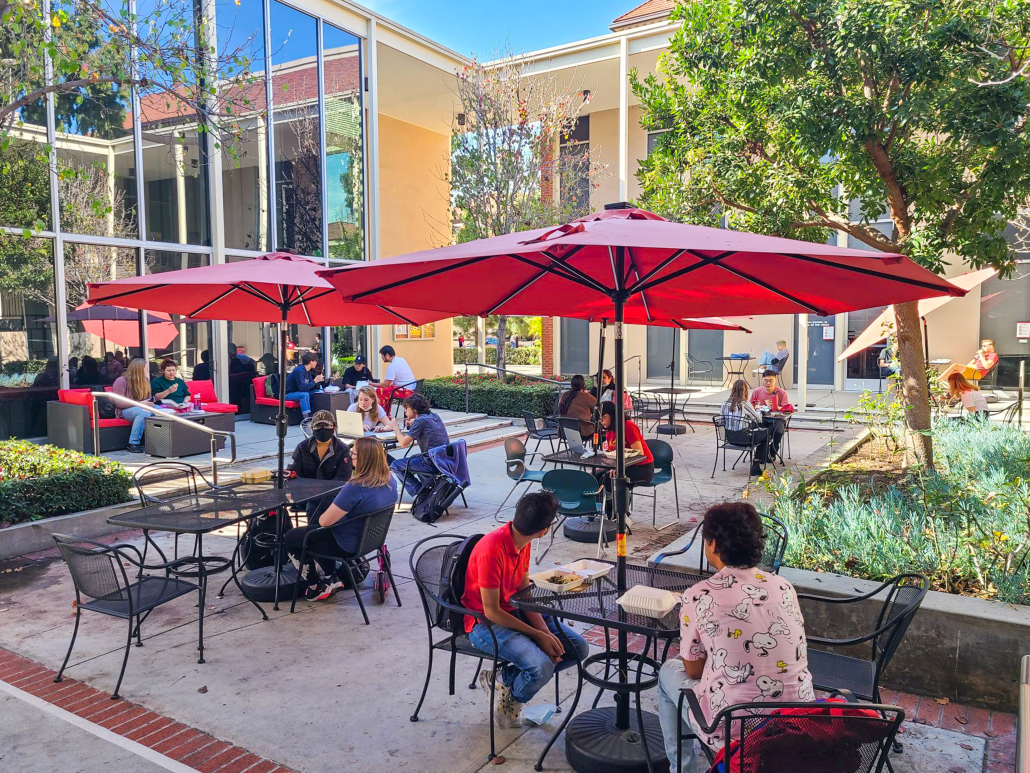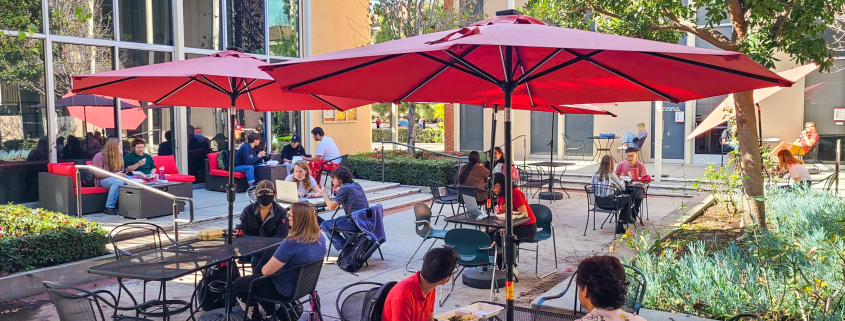Jubilee Co-op Cafe serves free vegan meals

After hearing about the free vegan meals offered at the USC Office of Religious and Spiritual Life courtyard through a group chat for QuestBridge recipients, Hyewon Choi, a sophomore majoring in communication, began attending the Jubilee Vegan Café regularly.
Attendees of the cafe are greeted by Rev. Sunny Kang at a sign in table decorated with informational pamphlets on the environmental and spiritual benefits of a plant-based diet. Once they register with their name and email address, they’re encouraged to grab their free meal and sit among other attendees throughout the courtyard. At each table are students gathered around, eating, working and talking.
Choi said she was surprised at how welcoming the cafe is to students and had not seen an outreach program like this during her time at USC.
“I have seen USC giving food during midterm or final week, but I haven’t seen this consistently,” Choi said.
To make the Jubilee Vegan Café happen, the Progressive Christians at USC teamed up with Vegans of Los Angeles and the USC Office of Religious and Spiritual Life to provide free weekly vegan meals to all members and registered guests.
Meals are provided at the Office of Religious and Spiritual Life Courtyard every Wednesday from noon to 1:30 p.m. Membership is open to all students, regardless of religious affiliation, and is free under the condition that members volunteer at least once a semester to set up and help cook the meals.
According to the United University Church’s website, the purpose of Jubilee Vegan Café is to “provide quality vegan food to support vegan students, staff, and faculty,” “promote vegan food and plant-based lifestyle among students, staff, and faculty” and to “educate and promote animal rights.” At the weekly lunches’ sign-in table, attendees can learn more about the environmental, spiritual and health benefits of a plant-based lifestyle through distributed pamphlets.
While the cafe gets established, the UUC provided food prepared by a caterer, but later in the semester, Senior Associate Dean of Religious Life Rev. Jim Burklo said that the cafe plans to launch a co-op by involving student members in cooking and serving the meals. The students at Progressive Christians at USC will cook alongside Jubilee Vegan Cafée members.
Previously, the Office of Religious and Spiritual Life worked with UUC to host the Good Karma Cafe. Established about 12 years ago, the Good Karma Cafe served as an accommodation for students who follow a vegetarian diet for a religious reason, and later developed into what Dean of Religious Life Varun Soni described as “an amazing place of community” where students could go meet new people.
“What we saw is that we really started it as a food accommodation resource, but it became an amazing place of community and connection and belonging and creativity,” said Soni in an interview with the Daily Trojan.
Good Karma Cafe served vegan meals for $11 out of the UUC building before the University bought the building from the church, which is now being renovated for the School of Dramatic Arts. Briefly, the Good Karma Cafe continued at the St. Mark’s Lutheran Church but closed down due to the coronavirus pandemic.
Soni said the Office of Religious and Spiritual Life came up with the idea for the Jubilee Vegan Café after the Good Karma Cafe shut down and they “began to imagine how [they] could continue in the same spirit.”
Burklo said that, at the time, the Good Karma Cafe was initially created, “there were not enough vegan options on campus,” and said that having those options is crucial for students whether they purchased a meal plan or not. Burklo said that the Progressive Christians at USC are committed to both social and environmental justice, and by continuing the work of supporting students with both a personal or religious commitment to plant-based eating, they adhere to the group’s mission.
Though the UUC relocated to Union Avenue after selling its building to the University, it continues to sponsor the Progressive Christians at USC and work with the University Religious Center, with which they collaboratively fund Jubilee Vegan Café.
The UUC is one of more than 60 congregations within USC’s “Defined Neighborhood Outreach Boundary,” which consists of a square mile radius around campus. The Office of Religious and Spiritual Life works directly with many of the larger congregations, Soni said, as a way to connect the USC community with the diverse community of L.A.
“Los Angeles is the most religiously diverse city in human history, and our neighborhood is really a microcosm of that diversity,” Soni said. “The whole world is in our neighborhood, worshiping and gathering in some way or another.”
The Jubilee Vegan Café welcomes all students, according to Burklo — which he described as “an oasis of friendship and community.” More than 50 different religious and spiritual clubs are hosted by the center alongside events and programs for students without a religious affiliation, such as biweekly vegan dinners hosted by the Secular Student Fellowship.
“All students on our campus are going through a spiritual growth process, whether it’s religious or not, and we’re there to serve them all,” Burklo said.

